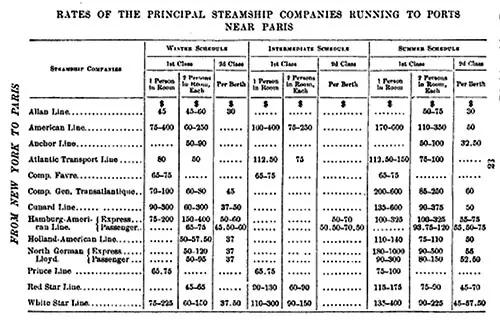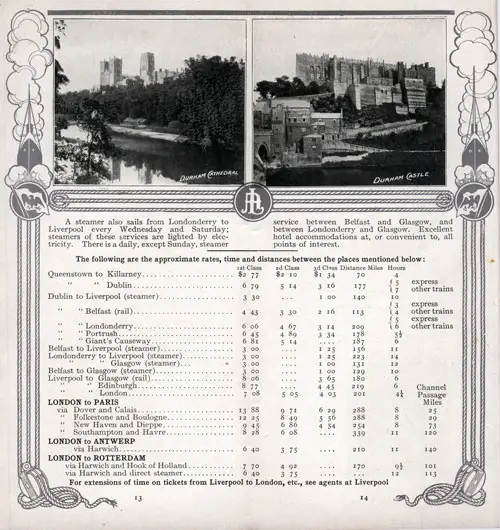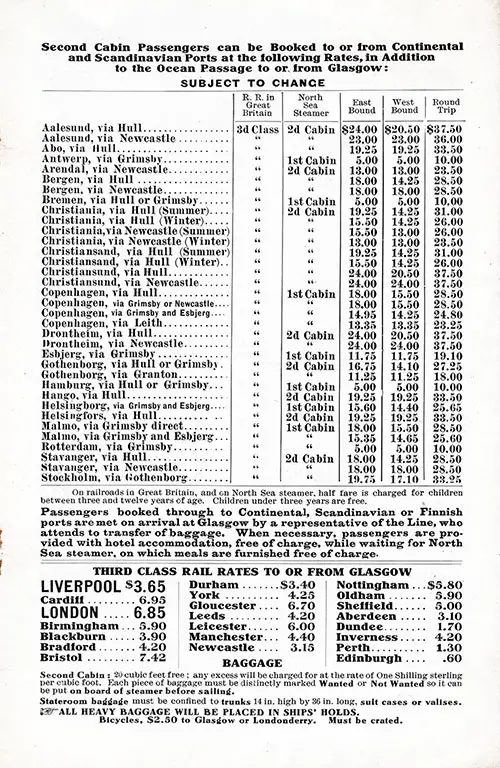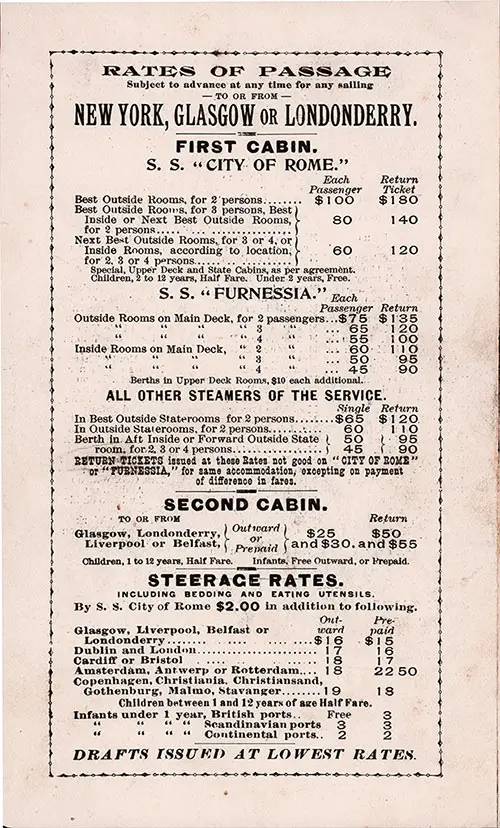Booking Passage on a Steamship – A Historical Guide to Ocean Travel Costs & Procedures
📌 Explore the fascinating history of booking steamship passage, from first-class luxury to third-class immigrant travel. Learn about ticket prices, contracts, and refund policies from major transatlantic lines. Essential reading for teachers, students, genealogists, and maritime historians.
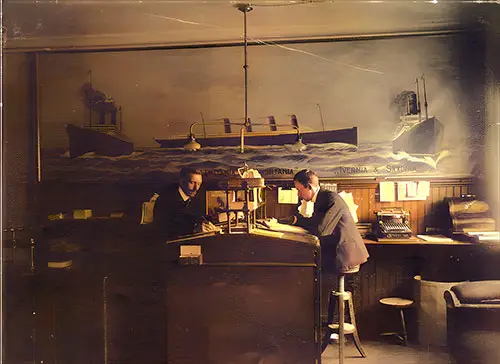
Cunard Line Ticket Office in Trondheim, Norway circa 1910. | GGA Image ID # 1789e932b9
Booking Passage on a Steamship – Understanding Ocean Travel Costs & Logistics 🚢🎫📜
The process of booking passage on a steamship in the late 19th and early 20th centuries was far more complex than simply purchasing a ticket. This article offers a deep dive into the financial, logistical, and contractual aspects of ocean travel, revealing a fascinating world of class distinctions, refund policies, prepaid tickets, and international booking procedures.
For teachers, students, genealogists, and historians, this resource provides an invaluable look at the practicalities of transatlantic migration and tourism, explaining why certain passengers paid vastly different fares and how early travel agencies and ticketing systems worked. The historical documents, including actual passenger contracts and ticket receipts, make this an indispensable resource for understanding ocean travel in the steamship era.
The cost of a first-class passage to Europe varies with the Line and the season of the year. Vessels of the first-class command a very high minimum rate even "out of season."
At the time of writing, it is hardly possible to obtain a first-class passage for less than $87.50 on good ships, and good accommodations will cost $110.00 to $125.00 on other than Mediterranean steamers.
The choicer cabins bring incredibly high prices. It is nothing unusual to find accommodations that are a thousand dollars or more for cabins for one or two persons.
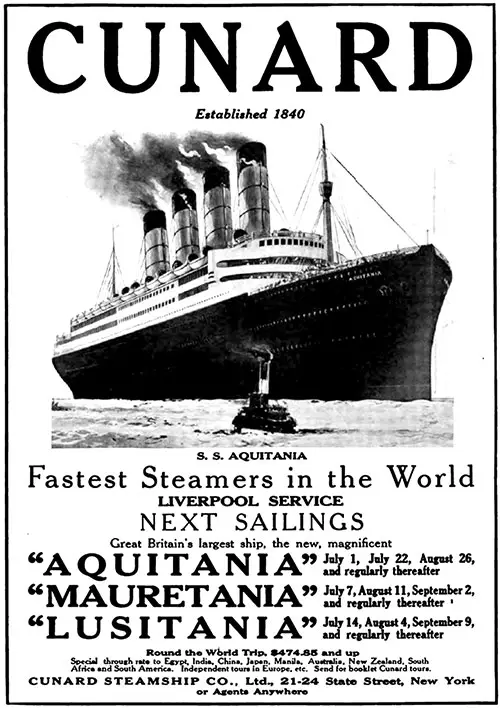
Advertisement from the Cunard Line Promoting Ships In Their New York - Liverpool Service -- Aquitania, Mauretania, and Lusitania. | GGA Image ID # 178a06b79b
There are many factors connected with the price of staterooms; the time of passage must be considered, for every increased knot of speed means a vastly increased coal consumption, which is almost inconceivable to the layman; the saving of a day in the passage may mean double coal consumption.
The costliness of ships must also be considered. It naturally costs more to travel in a vessel that has spent $7,000.000 than in a comparatively small and cheap ocean liner costing five or six hundred thousand.
A slower boat with a large freight-carrying capacity is often more comfortable than the express steamer, which races through the water at a high rate of speed with constant vibration. The number of passengers is also much more limited, and there is more room for promenading and for the steamer chairs.
Those who wish to rest at sea should bear this in mind. The traveler who desires comfortable lounges, palm-gardens, Dutch cafés, gymnasiums, and Turkish baths, electric baths, etc., should be willing to pay some $25.00 or more extra for each passage.
The proper plan to pursue is to write to the New York office of the five or six principal trans-Atlantic lines. The intending traveler will receive courteous letters accompanied by diagrams and price lists of all staterooms; this will enable one to select accommodations within his means. The minimum fares charged when accommodations are available are given beyond, so apply early if you seek low fares.

Interior View of the Hamburg-American Line Office in St. Louis, Missouri. | GGA Image ID # 178a189f03
Berths are usually not considered engaged unless secured by a payment of 25 percent of the passage money, and never less than $25.00 per berth for first cabin accommodations.
The balance of the passage money, both outward and return, should be paid and the receipt surrendered at least three weeks prior to the date scheduled for the sailing from the port of New York. Otherwise, the company reserves the right to dispose of such reserved accommodations to others, and the sum paid is forfeited if the engaged berth or berths have not been resold.
Rates of the Principal Steamship Companies Running from New York to Ports Near Paris. Harper's Guide to Paris 1900. | GGA Image ID # 178aef57d4. Click to View a Larger Image.
In case of sickness or death, the company usually refunds all except the agent's' commission. In case of necessity, the lines have the right to substitute some other steamer or steamers, and even change the date of sailing without notice, and passengers have no claim or demand upon the companies except for a refund of the amount paid on account of the accommodation reserved.
When applying for berths, either by mail or wire, the name of the steamer, date of sailing, the number and sex of passengers, and the desired class of accommodations should be stated.
Passengers who do not sail on a steamer for which they have engaged accommodations, or purchased a ticket, will forfeit fifty percent of the passage money unless notice is given not later than three weeks previous to sailing or the accommodations have been re-sold.
When passengers are kept from sailing by misadventure, they usually allow them to sail on other steamers of the same Line. A steamship company is a business corporation, and their good nature, which is large, should not be imposed upon.
Prepaid tickets are good for a year and are not transferable, and may be extended by paying the difference between the rate in effect at the date of issue and date of sailing. Each company has special rules for the cancellation of such tickets.
Return tickets may be extended by paying the difference between the rate in effect at the date of issue and sailing. There are special regulations relative to cancellation, which may be learned by addressing the company issuing the ticket.
Rates from Ports in the UK to Continental European Ports, 1907. | GGA Image ID # 178b1a225b. Click to View a Larger Image.
The return portion of first and second cabin round trip tickets is available for return passage by any of the following lines, provided the tickets have been issued by one of the other lines or at the option of the holder will be accepted for passage by any of the following lines: American Line, Atlantic Transport Line, Austro-American Line, Cunard Line, Dominion Line French Line, Hamburg America Line, Holland-America Line, Leyland Line, North German Lloyd, Red Star Line, White Star Line.
Provided:
- (a) There be room vacant on the steamer by which the passenger desires to sail.
- (b) All the conditions in the ticket and regulations of the carrying line shall be accepted and binding on the passenger whether they are contained in the original return ticket, which the passenger holds or not.
- (c) That the passenger pays the difference if any, between the value of the accommodation called for and the value of the accommodation he selects in the steamer by which he travels.
- (d) In the event of the original return ticket calling for transportation on a specific steamer or date, the transfer cannot be made unless an application for transfer is presented more than 28 days before such specific date unless the passenger, at the time of making an application for transfer, presents the authority of the Line for which the original return ticket was issued, for the transfer being made.
- (e) In the event of the passenger selecting accommodations of a lower tariff rate than that shown on the original return ticket, the difference between the value of the accommodation called for and the value of the selected accommodation will be refunded by the carrying Line, less 10 percent.
Second Cabin Rates of Passage to Europe and Scandinavia, 1913. | GGA Image ID # 178c2ef604. Click to View a Larger Image.
First and second cabin return tickets issued by any of the above-mentioned lines will also be accepted for passage by any other of them, subject to the usual conditions.
Return tickets and prepaid tickets issued at a certain rate will only be available for transportation covered by such rate. Holders of such tickets, desiring to sail on a steamer or in accommodations for which a higher rate is in force, will be required to pay the additional fare, or in case lower-priced accommodations are engaged, the difference will be refunded, subject to the company's rules.
Return accommodations may be secured through the company's general passenger offices, by cable by letter: if by cable, at the passenger's expense.
Suppose a passenger is prevented from sailing on a steamer for which return accommodations have been reserved, a transfer to an earlier or later steamer can be made by applying to the company's general passenger office, provided an application for this transfer be made not later than three weeks previous to the departure of the steamer on which berths had originally been reserved.
On some lines, servants accompanying first cabin passengers, if they have access to the first cabin accommodations, must pay a special rate, which will be made known on application to the company. On other lines, servants pay second class rates but have access to the first cabin accommodations. If interested, write to the company for their rates and rules.
Rates of Passage for First and Second Cabin from the Anchor Line, 1895. | GGA Image ID # 178c6f4edc. Click to View a Larger Image.
Such is in brief about all the general information which can be given on the subject of the securing or berths or staterooms. The various companies' practice is so widely at variance that nothing more of a general nature can be given. Each company employs a corps of correspondents who are entirely familiar with the transportation business and whose pleasure it is to reply fully regarding such special information as the cost of transporting bicycles, automobiles, dogs and other animals, excess baggage, and transportation of infants; special regulations as to children, etc.
The relative number of cabin passengers carried has, of course, a certain bearing on the standing of the Line. Thus, a Line bringing over six, eight, or ten thousand passengers, is much to be preferred to a Line that only carries three, four, or five hundred first cabin passengers a year.
In nearly all cases, the smaller number of passengers indicates lower rates. As the names of the agents are given, and they all have offices in New York City (the addresses being given elsewhere), they can be readily addressed for rates, information as to baggage, sailings, etc. All of these agents have telephones and may be communicated with by those living in New York or the immediate vicinity by this means. It is hoped that this official table may prove of considerable value to the intending traveler.
In a general way, however, it is valuable as showing average minimum rates. Of course, it is not possible to obtain accommodations at these rates unless very early application is made, or steamers are carrying very few passengers. The steamer companies should, in all cases, be written to before it is assumed that accommodations at the minimum rate can be supplied. The big tourist agencies also sell tickets by all lines.
While the prospective traveler is assumed in the majority of cases to embark at New York, still the information given applies to other ports as well. The maps of harbors include Portland, Boston, Philadelphia, San Francisco and Seattle. The list of steamers plying from other ports is covered as far as possible, but changes are very apt to occur, which cannot be guarded against in a work of this kind.
Sampling of Contracts and Receipts for Passage
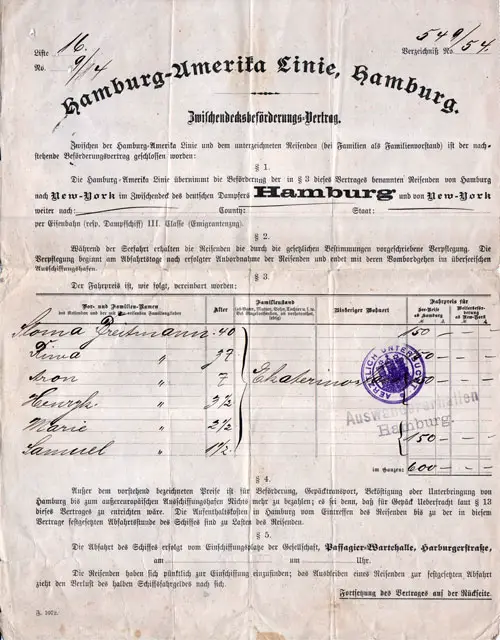
Hamburg-Amerika Linie Passage Contract, Hamburg to New York, 1904, for Family of 2 Adults, 4 Children. | GGA Image ID # 178cc27c72

Counterpart of Passenger Contract Ticket for Passage from Cape Town, South Africa to Southampton, 1904. | GGA Image ID # 178d14cb12
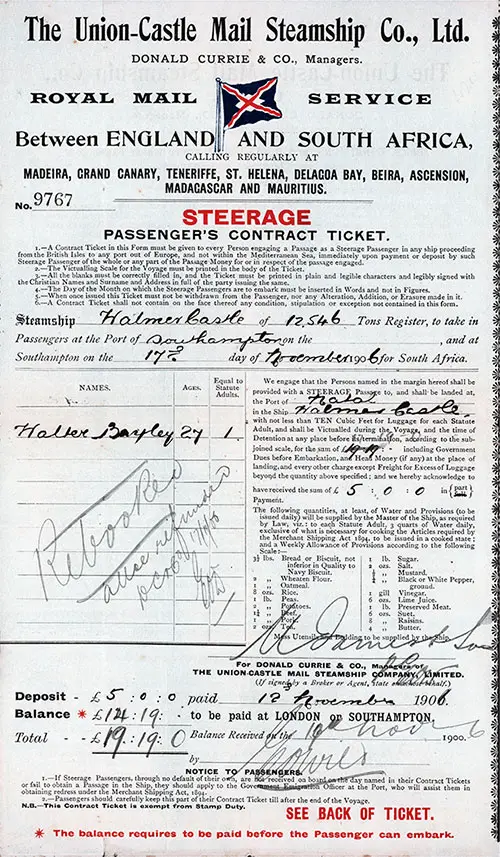
Steerage Passenger's Contract Ticket, Southampton to Natal dated 17 November 1906. The passenger rebooked for a later voyage. | GGA Image ID # 178d3e626d
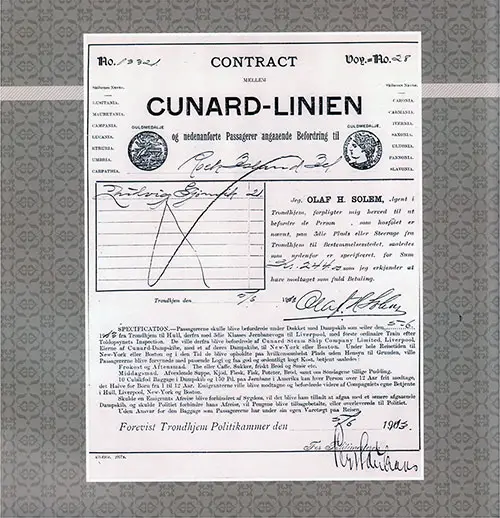
Cunard Line Passage Contract, Third Class/Steerage, Trondheim, Norway to Boston, 1913. | GGA Image ID # 178c7bc519
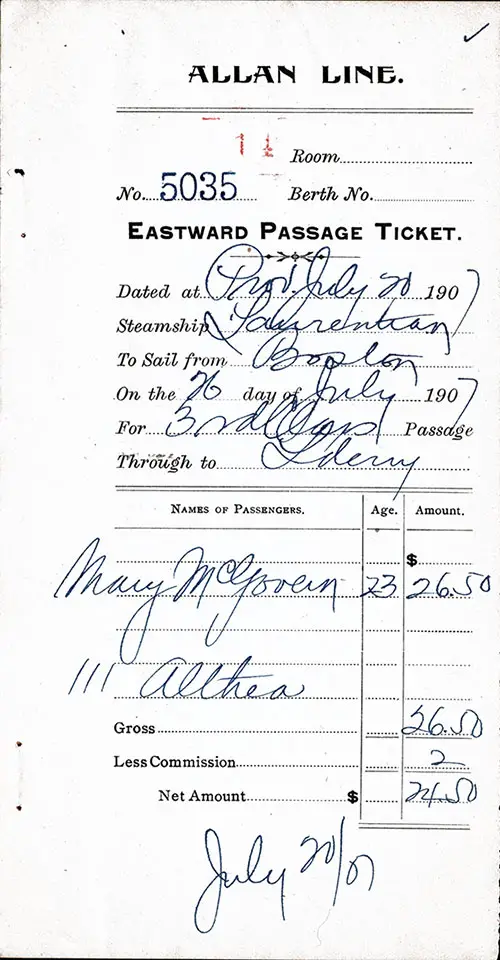
Allan Line Agent's Receipt for Passage on the SS Laurentian from Boston to Londonderry, 26 July 1907. | GGA Image ID # 178d499b4f
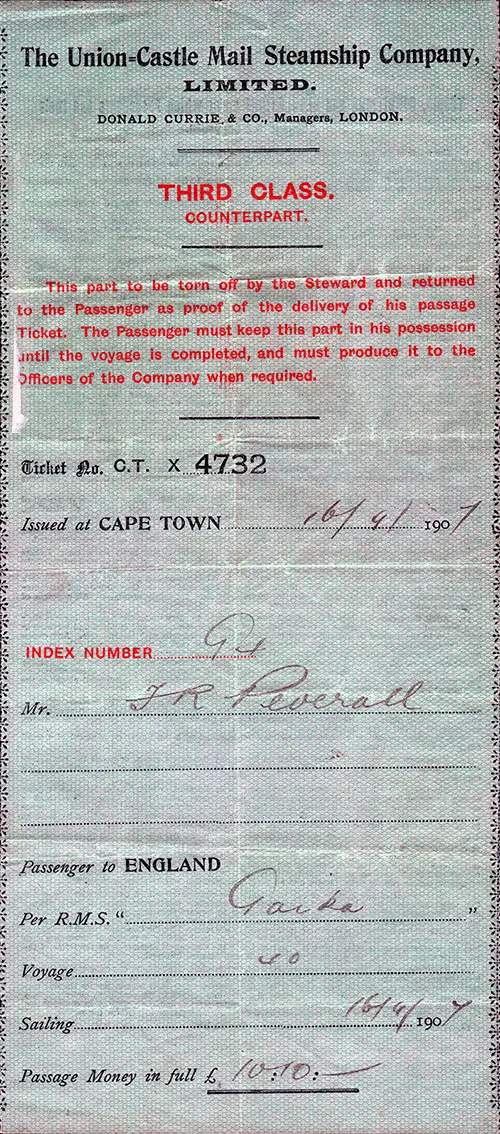
Third Class Counterpart Ticket for Passage from Cape Town to Southampton on the SS Garka of the Union-Castle Mail Steamship Company on 16 September 1907. Cost of the Ticket was £10:10:0. | GGA Image ID # 178d86dc7c
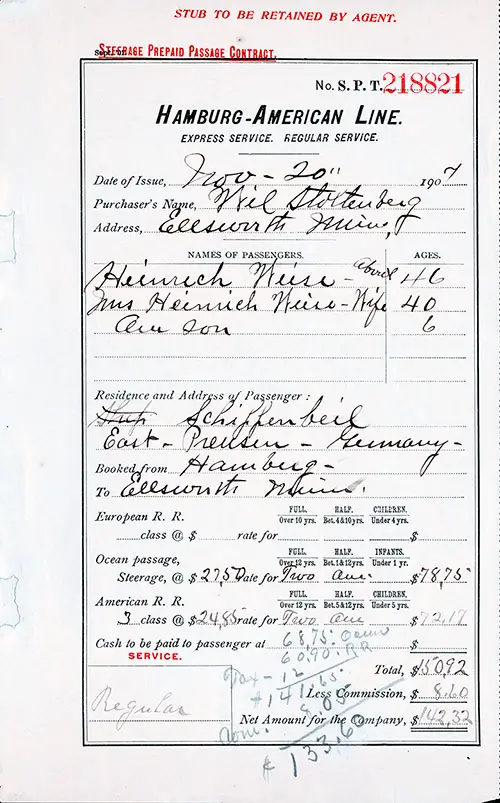
Agent's Receipt for a Steerage Prepaid Passage Contract on the Hamburg-American Line from Hamburg to New York (with Final Destination of Ellsworth, Minnesota). Ocean Fare for Two Adults and One Child (6 Years Old) was $78.75. | GGA Image ID # 178e0c76cd
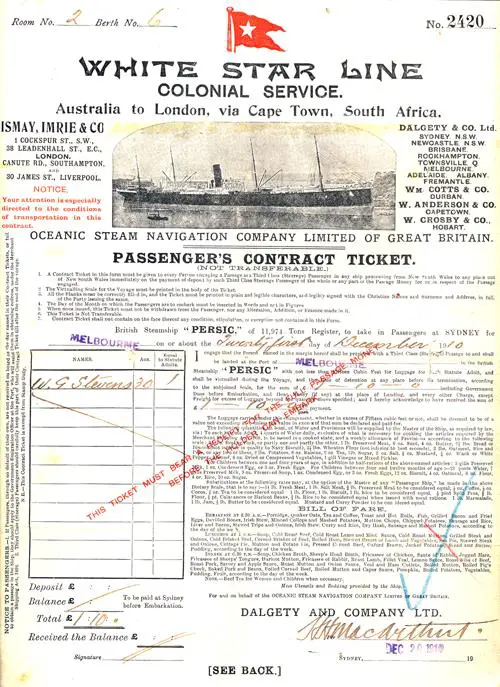
White Star Line Colonial Service Passenger's Contract Ticket from Sydney to Melbourne on the SS Persic, 21 December 1910 for a total fare of £1:10:0. | GGA Image ID # 178e5e1b94
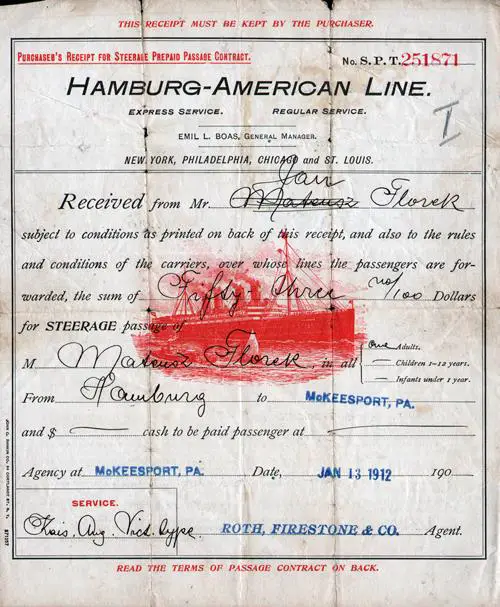
Purchaser's Receipt for Steerage Prepaid Passage Contract on the Hamburg-American Line of $53.00 for Steerage Passage from Hamburg to New York (McKeesport, PA being the final destination), dated 13 January 1912. | GGA Image ID # 178e94abc0
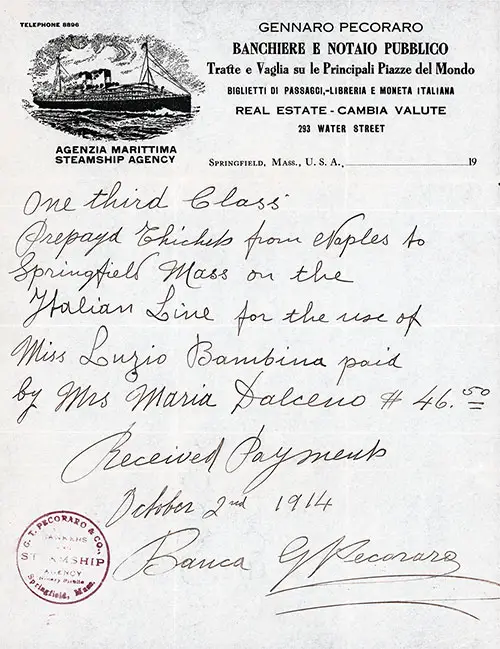
Steamship Agency Handwritten Receipt for One Third Class Prepaid Ticket from Naples to New York (Springfield, Massachusetts is the final destination) on the Italian Line, for a cost of $46.50 dated 2 October 1914. | GGA Image ID # 178eac18dc
Who Should Read This & Why?
📚 Teachers & Students
✅ Provides a detailed case study on how ocean travel influenced migration, business, and tourism
✅ Useful for economics and history lessons about price fluctuations, luxury travel, and immigration costs
✅ A primary source for understanding the ticketing and refund policies of major shipping lines
🏡 Genealogists & Family Historians
✅ Explains how ancestors booked their transatlantic journeys
✅ Helps researchers identify historical passage contracts and receipts
✅ Sheds light on prepaid tickets, a common method for sponsoring family members' immigration
⚓ Maritime & Travel Historians
✅ Documents the evolution of ticketing policies among major steamship companies
✅ Shows class distinctions in ocean travel and the pricing of first-class vs. steerage accommodations
✅ Provides rare insights into contract regulations, refunds, and company policies
Most Fascinating Aspects of This Article
1. The Cost of Ocean Travel – A Matter of Class & Comfort 💰🚢
The article reveals how the cost of a steamship ticket varied dramatically based on class, ship size, and speed.
🔹 First-class fares ranged from $87.50 to over $1,000, depending on the season and accommodations.
🔹 Second-class tickets were significantly cheaper, though still priced for middle-class travelers.
🔹 Steerage passengers, primarily immigrants, paid the least but endured harsh conditions in crowded spaces below deck.
💡 Why It’s Interesting: These prices highlight the vast wealth gap among travelers, with first-class passengers enjoying luxury lounges and Turkish baths while steerage travelers slept in dormitory-style bunks.
2. How Steamship Companies Handled Bookings & Refunds 📜
Booking a passage was a highly structured process with strict rules on payments, cancellations, and refunds.
🔹 A 25% deposit (or at least $25 per berth) was required to secure a first-class ticket.
🔹 The full balance was due three weeks before departure—failure to pay resulted in forfeiture of the deposit.
🔹 If a passenger became ill or died, most companies refunded the fare minus the agent’s commission.
🔹 If a ship was changed or a voyage delayed, passengers were only entitled to a refund—no further compensation was provided.
💡 Why It’s Interesting: These policies mirror modern airline rules, showing that passenger rights and refund issues have long been part of the travel industry.
3. Prepaid Tickets – A Lifeline for Immigrants 🛂
Many immigrants arrived in the U.S. or Canada using prepaid tickets sent by relatives who had already settled abroad.
🔹 These tickets were non-transferable and valid for one year, though extensions were possible with an additional fee.
🔹 Refund policies varied widely—some allowed transfers to later voyages, while others charged penalties for cancellations.
🔹 Steamship companies closely regulated prepaid fares, ensuring they weren’t resold or misused.
💡 Why It’s Interesting: This system allowed families to reunite but also created financial risks if passengers couldn’t make the journey in time.
4. Round-Trip & Interchangeable Tickets – Flexibility for Wealthy Travelers 🎟️🌍
Unlike prepaid immigrant tickets, wealthy travelers had more flexibility in their travel arrangements.
🔹 Round-trip tickets could be used on multiple different steamship lines, including Cunard, White Star, and Hamburg-America.
🔹 Passengers could switch to a different ship or class, provided they paid the difference in fare.
🔹 If they downgraded their accommodations, they could receive a partial refund (minus a 10% deduction).
💡 Why It’s Interesting: This level of travel flexibility was reserved for the wealthy, whereas immigrants had few, if any, options for changes or refunds.
5. The Role of Steamship Ticket Offices & Agents 🏢
The Cunard Line Ticket Office in Trondheim, Norway and the Hamburg-American Line Office in St. Louis demonstrate how steamship companies operated a vast network of offices worldwide.
🔹 Local agents helped passengers book passage and navigate complex regulations.
🔹 Ticket offices acted as financial intermediaries, handling currency exchanges and installment payments for travel.
🔹 Many agencies also offered travel insurance, protecting passengers from sudden cancellations or illness.
💡 Why It’s Interesting: These offices functioned like early travel agencies, helping passengers book passage, exchange money, and prepare documentation.
Key Takeaways for Research & Essay Writing
📌 For Students & Teachers:
🔹 A perfect topic for research papers on how transatlantic travel shaped global migration
🔹 Highlights economic disparities in travel and the impact of early booking systems on modern travel policies
🔹 Provides insight into how ticketing policies influenced migration patterns
📌 For Genealogists & Family Historians:
🔹 Explains how ancestors booked passage and why their names appear on prepaid ticket records
🔹 Helps identify historical documents like passage contracts, receipts, and ticket stubs
🔹 Provides context for immigration records and passenger manifests
📌 For Historians & Maritime Researchers:
🔹 Demonstrates the evolution of passenger rights and refund policies in travel
🔹 Highlights the marketing tactics used by different steamship lines to attract passengers
🔹 Shows the business side of ocean travel, from ticket sales to onboard services
Final Thoughts: A Window into the World of Steamship Travel
This article offers an extraordinary glimpse into the mechanics of ocean travel, from ticket prices and booking policies to refund regulations and passenger contracts. It provides valuable insights into the practical realities of early transatlantic voyages, making it an essential resource for understanding migration, tourism, and business in the steamship era.
🔍 How did travel agencies evolve from selling steamship tickets to modern airline bookings? What similarities exist between early ocean travel contracts and modern-day airline policies? 🤔
📖 Explore this rich history and uncover the fascinating world of booking passage on a steamship! 🚢🎫📜

